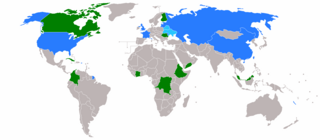
The 1989 United Nations Security Council election was held on 18 October 1989 during the Forty-fourth session of the United Nations General Assembly, held at UN Headquarters in New York City. The General Assembly elected Côte d'Ivoire, Cuba, Romania, South Yemen, and Zaire, as the five new non-permanent members of the UN Security Council for two-year mandates commencing on 1 January 1990. This was the first time Yemen was elected to the Council, as Yemeni unification occurred during South Yemen membership.
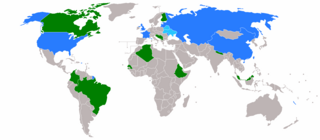
The 1988 United Nations Security Council election was held on 26 October 1988 during the Forty-third session of the United Nations General Assembly, held at United Nations Headquarters in New York City. The General Assembly elected Canada, Colombia, Ethiopia, Finland, and Malaysia, as the five new non-permanent members of the UN Security Council for two-year mandates commencing on 1 January 1989.

The 1987 United Nations Security Council election was held on 15 October 1987 during the Forty-second session of the United Nations General Assembly, held at United Nations Headquarters in New York City. The General Assembly elected Algeria, Brazil, Nepal, Senegal, and Yugoslavia, as the five new non-permanent members of the UN Security Council for two-year mandates commencing on 1 January 1988.

The 1986 United Nations Security Council election was held on 16 October 1986 during the Forty-first session of the United Nations General Assembly, held at United Nations Headquarters in New York City. The General Assembly elected Argentina, Italy, Japan, West Germany, and Zambia, as the five new non-permanent members of the UN Security Council for two-year mandates commencing on 1 January 1987.

The 1985 United Nations Security Council election was held on 17 October 1985 during the Fortieth session of the United Nations General Assembly, held at United Nations Headquarters in New York City. The General Assembly elected Bulgaria, Congo, Ghana, the United Arab Emirates, and Venezuela, as the five new non-permanent members of the UN Security Council for two-year mandates commencing on 1 January 1986. 1985 marks the first election of Congo and the United Arab Emirates to the Council.

The 1976 United Nations Security Council election was held on 21 October 1976 during the Thirty-first session of the United Nations General Assembly, held at United Nations Headquarters in New York City. The General Assembly elected Canada, the Federal Republic of Germany, India, Mauritius, and Venezuela, as the five new non-permanent members of the UN Security Council for two-year mandates commencing on 1 January 1977. Both Mauritius and West Germany were elected members of the council for the first time.

The 1984 United Nations Security Council election was held from 22 October to 18 December 1984 during the Thirty-ninth session of the United Nations General Assembly, held at United Nations Headquarters in New York City. The General Assembly elected Australia, Denmark, Madagascar, Thailand, and Trinidad and Tobago, as the five new non-permanent members of the UN Security Council for two-year mandates commencing on 1 January 1985. Madagascar, Thailand and Trinidad and Tobago were elected to Council for the first time.

The 1983 United Nations Security Council election was held on 31 October 1983 during the Thirty-eighth session of the United Nations General Assembly, held at United Nations Headquarters in New York City. The General Assembly elected Egypt, India, Peru, the Ukrainian SSR, and Upper Volta, as the five new non-permanent members of the UN Security Council for two-year mandates commencing on 1 January 1984.

The 1982 United Nations Security Council election was held on 19 October 1982 during the Thirty-seventh session of the United Nations General Assembly, held at United Nations Headquarters in New York City. The General Assembly elected Malta, the Netherlands, Nicaragua, Pakistan, and Zimbabwe, as the five new non-permanent members of the UN Security Council for two-year mandates commencing on 1 January 1983. Both Malta and Zimbabwe were elected members of the Council for the first time.

The 1981 United Nations Security Council election was held on 15 October 1981 during the Thirty-sixth session of the United Nations General Assembly, held at United Nations Headquarters in New York City. The General Assembly elected Guyana, Jordan, Poland, Togo, and Zaire, as the five new non-permanent members of the UN Security Council for two-year mandates commencing on 1 January 1982. Togo and Zaire were elected for the first time.
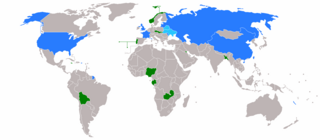
The 1978 United Nations Security Council election was held on 10 November 1978 during the Thirty-third session of the United Nations General Assembly, held at United Nations Headquarters in New York City. The General Assembly elected Bangladesh, Jamaica, Norway, Portugal, and Zambia, as the five new non-permanent members of the UN Security Council for two-year mandates commencing on 1 January 1979. Notably, Bangladesh, Jamaica and Portugal were elected members of the council for the first time.

The 1975 United Nations Security Council election was held on between 20 October and 23 October 1975 during the Thirtieth session of the United Nations General Assembly, held at United Nations Headquarters in New York City. The General Assembly elected Dahomey, Libya, Pakistan, Panama, and Romania, as the five new non-permanent members of the UN Security Council for two-year mandates commencing on 1 January 1976. Benin and Libya were elected for the first time.
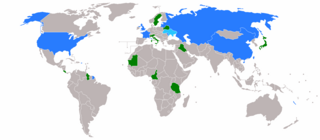
The 1974 United Nations Security Council election was held on 11 October 1974 during the Twenty-ninth session of the United Nations General Assembly, held at United Nations Headquarters in New York City. The General Assembly elected Guyana, Italy, Japan, Sweden, and Tanzania, as the five new non-permanent members of the UN Security Council for two-year mandates commencing on 1 January 1975. Both Guyana and Tanzania were elected to the council for the first time.

The 1972 United Nations Security Council election was held on 20 October 1972 during the Twenty-seventh session of the United Nations General Assembly, held at United Nations Headquarters in New York City. The General Assembly elected Australia, Austria, Indonesia, Kenya, and Peru, as the five new non-permanent members of the UN Security Council for two-year mandates commencing on 1 January 1973. In addition, Austria, Indonesia and Kenya were elected into the council for the first time.

The 1971 United Nations Security Council election was held on 23 November 1971 during the Twenty-sixth session of the United Nations General Assembly, held at United Nations Headquarters in New York City. The General Assembly elected Guinea, India, Panama, Sudan, and Yugoslavia, as the five new non-permanent members of the UN Security Council for two-year mandates commencing on 1 January 1972. It was the first election of Guinea and Sudan into the council.

The 1970 United Nations Security Council election was held on 26 October 1970 during the Twenty-fifth session of the United Nations General Assembly, held at United Nations Headquarters in New York City. The General Assembly elected Argentina, Belgium, Italy, Japan, and Somalia, as the five new non-permanent members of the UN Security Council for two-year mandates commencing on 1 January 1971.

The 1969 United Nations Security Council election was held on 20 October 1969 during the Twenty-fourth session of the United Nations General Assembly, held at United Nations Headquarters in New York City. The General Assembly elected the Burundi, Nicaragua, Poland, Sierra Leone, and Syria, as the five new non-permanent members of the UN Security Council for two-year mandates commencing on 1 January 1970. It was the first time Burundi, Nicaragua and Sierra Leone were elected members of the council.
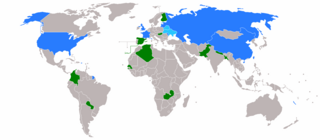
The 1968 United Nations Security Council election was held on 1 November 1968 during the Twenty-third session of the United Nations General Assembly, held at United Nations Headquarters in New York City. The General Assembly elected Colombia, Finland, Nepal, Spain, and Zambia, as the five new non-permanent members of the UN Security Council for two-year mandates commencing on 1 January 1969.
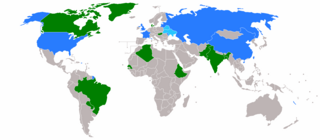
The 1967 United Nations Security Council election was held on 6 November 1967 during the Twenty-second session of the United Nations General Assembly, held at United Nations Headquarters in New York City. The General Assembly elected Algeria, Hungary, Pakistan, Paraguay, and Senegal, as the five new non-permanent members of the UN Security Council for two-year mandates commencing on 1 January 1968. Algeria and Senegal saw their first election into the council.

The 1966 United Nations Security Council election was held on 11 November 1966 during the Twenty-first session of the United Nations General Assembly, held at United Nations Headquarters in New York City. The General Assembly elected Brazil, Canada, Denmark, Ethiopia, and India, as the five new non-permanent members of the UN Security Council for two-year mandates commencing on 1 January 1967.




















